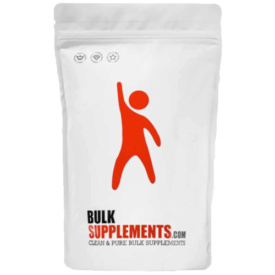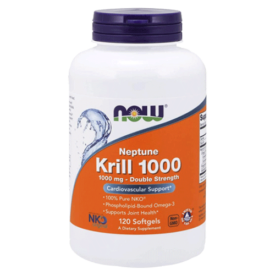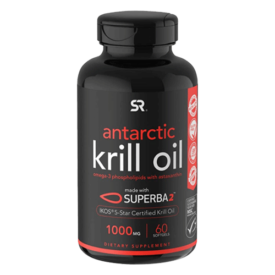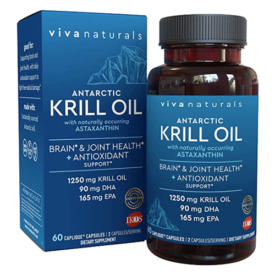What Is the Best Krill Oil Brand in Australia
Krill oil has seen a significant increase in popularity as a means of ingesting more Omega-3 fatty acids. It's often compared to fish oil as both products deliver Omega-3s, but krill oil may be absorbed more easily and could provide more antioxidants. There's a surprising amount of variety when it comes to krill oil supplements, including how they're sourced and processed. We've rounded up some of the best options on the market.
The Best Krill Oil Supplements
- Best Krill Oil For Omega-3: Transparent Labs CoreSeries Krill Oil
- Best Value Krill Oil: BulkSupplements Krill Oil
- Best Krill Oil For Cholesterol: NOW Supplements Neptune Krill
- Best Krill Oil Phospholipid Delivery: Sports Research Antarctic Krill Oil
- Best Krill Oil For Pescatarians: Viva Naturals Antarctic Krill Oil
Editor's note: The content on BarBend is meant to be informative in nature, but it should not be taken as medical advice. The opinions and articles on this site are not intended for use as diagnosis, prevention, and/or treatment of health problems. It's always a good idea to talk to your doctor before beginning a new fitness, nutritional, and/or supplement routine. Individual needs for vitamins and minerals will vary.
Best Krill Oil For Omega-3
Transparent Labs CoreSeries Krill Oil is extracted from Antarctic krill. It contains no mercury, is loaded with Omega-3 fatty acids EPA and DHA, and made to be easier on the stomach when compared to most fish oils. The Omega-3 content was strong enough that this product also topped our list of best Omega-3 supplements.
Transparent Labs CoreSeries Krill Oil

Transparent Labs CoreSeries Krill Oil
This oil is extracted from Antarctic krill, which is rich in the long-chain omega-3 fatty acids EPA and DHA. It is designed to avoid any fishy aftertaste, contains no mercury, and 80 micrograms of the antioxidant astaxanthin.
On top of being a great source for Omega-3s, Transparent Labs foregoes any artificial sweeteners, colorings, and preservatives. They are compatible with gluten-free diets and are non-GMO.
Who Should Take Transparent Labs CoreSeries Krill Oil
- Anyone looking to supplement their Omega-3 intake.
- Those who hate fishy flavors.
- People aiming to avoid any artificial additives.
Who Shouldn't Take Transparent Labs CoreSeries Krill Oil
- Folks who are concerned about sustainability (this product is not certified).
- People with a limited budget for supplements.
Despite not being certified, this krill oil is still tested to ensure that it does not contain a single trace of heavy metals. The purity of the product combined with the content of Omega-3 places it at the top of yet another list.
[Related: Could Baking Soda Be The Best Workout Supplement You've Never Tried?]
Best Value Krill Oil
Their krill oil is lab tested for purity and label accuracy, which is a somewhat underrepresented aspect across a lot of the krill oil market. They guarantee that their product is free from sugar, soy, dairy, yeast, gluten, corn, and additives — a nice reassurance for people who have specific dietary needs.
Bulksupplements Krill Oil

Bulksupplements Krill Oil
BulkSupplements sells their products, well, in bulk, meaning they offer a very cost effective krill oil option. Their product is lab tested for purity and potency.
Despite paying heed to getting tested for label accuracy, it lacks any certifications for sustainability like some of its competitors. That isn't a deal-breaker for some, particularly those who value cost-efficiency more, but it is something to be aware of.
Who Should TakeBulkSupplements Krill Oil
- People who want certificates of analysis. BulkSupplements will provide them upon request to prove that each batch is tested for purity.
- Customers can purchase up to 10,000 capsules at a time, which can (ultimately) save a considerable amount of money.
Who Shouldn't TakeBulkSupplements Krill Oil
- Folks upset by a lack of certifications for sustainability from organizations like MSC or Friend of the Sea.
- People who want specifics as to the origin or the krill used. BulkSupplements doesn't reveal the country of origin for their krill, as it's sourced from various places.
- Anyone who follows a kosher or halal diet.
When push comes to shove, it is going to be quite difficult to find a better bang for your buck when it comes to buying krill oil. The sheer volume available to purchase by BulkSupplements dwarfs their competitors. With that benefit does come tradeoffs, though. Sourcing krill from various sources means that there isn't a specific origin to point to that will coincide with the batch you receive. The purity testing was enough to still earn a respectable rank on our list, and for anyone looking to buy in bulk, you found your match.
Best For Cholesterol
NOW takes the unusual avenue of using Neptune Krill Oil (NKO), which contains more phospholipids than many of its competitors. Research has found that these fats may be significant with regard to managing cholesterol and more effective at reducing glucose and triglycerides when compared to fish oil. (1) However, it is best to talk to your doctor before beginning any new supplementation regimen, especially if you have an existing condition like high cholesterol.
NOW Supplements Neptune Krill

NOW Supplements Neptune Krill
A high phospholipid krill oil that carries rigorous certifications for both sustainability and potency. Each single-softgel serving provides one gram of krill oil and 250 milligrams of Omega-3.
In addition, this krill oil carries certifications from third-party tester UL and sustainability organization Friend of the Sea.
Who Should Take NOW Supplements Neptune Krill
- Anyone looking to prioritize phospholipid content in their supplement.
- People who prefer certifications from Friend of the Sea and a third-party testing organization.
Who Shouldn't Take NOW Supplements Neptune Krill
- Folks who cannot consume bovine gelatin — they're pork-free, but still may be off-limits for certain consumers.
- Conservative spenders. While the cost per serving is reasonable, the minimum sized bottle one can purchase contains 120 servings, so it might be a bigger commitment than some consumers might be prepared for.
Although the sizing options per purchase may seem suspect, the bottom line is that this Neptune krill oil holds up against our other competitors vying for a spot on this list. The additional phospholipids make this a major contender for anyone seeking krill oil.
[Related: The Best Types Of Supplements For Performance, Weight Loss, And Health]
Best Krill Oil For Phospholipid Delivery
Sports Research differentiates itself by using Superba 2 krill oil, which is developed in such a manner that it potentially delivers more phospholipids per serving. This extra delivery, so to speak, may be beneficial for heart health and leaves less of a fishy aftertaste. An important dietary note is that the gelatin used in these capsules is kosher.
Sports Research Antarctic Krill Oil

Sports Research Antarctic Krill Oil
This krill oil is high in phospholipids (400 milligrams per serving) and certified by IKOS and MSC. Each serving of one liquid softgel packs 1 gram of krill oil and 240 milligrams of Omega-3.
The product is also certified by IKOS and MSC, which shows a dedication to purity and sustainability.
Who Should TakeSports Research Antarctic Krill Oil
- Sports Research uses krill oil from Superba, which is higher in phospholipids and less likely to smell.
- Folks who value certifications from IKOS and MSC for third party purity, potency, and sustainability testing.
- Anyone who follows a kosher diet.
Who Shouldn't TakeSports Research Antarctic Krill Oil
- Anyone who can't consume bovine products (even though this product is pork-free).
What's nice about krill oil is that although it may seem as though products may appear to not differentiate from each other, there are some key measures that sellers use to stand out. Providing a higher phospholipid count may draw consumers who are most interested in heart health management.
[Related: Intermittent Fasting 101: A Guide To Benefits, Muscle Gain, And More]
Best Krill Oil For Pescatarians
With an unusually high dose of 330 milligrams of Omega-3s per serving, Viva Naturals stands out for its potency and for its rigorous testing: it's not only been third-party tested for label accuracy, but it also carries certifications from both Friend of the Sea and The International Krill Oil Standard (IKOS). IKOS tests for contaminants and stability, as well as for label accuracy.
Viva Naturals Antarctic Krill Oil

Viva Naturals Antarctic Krill Oil
A particularly potent krill oil that carries multiple certifications for purity and sustainability. Pescetarian-friendly, each two-capsule serving provides 1,250 milligrams of krill oil.
Who Should TakeViva Naturals Antarctic Krill Oil
- Anyone who would value their multiple certifications for purity and sustainability.
- Pescatarians — the capsules are made with tilapia gelatin, so they contain nonpork and/or beef.
Who Shouldn't TakeViva Naturals Antarctic Krill Oil
- Anyone not prepared to buy into the pricier end of the krill oil market.
- People who are not comfortable swallowing larger capsules.
Having a higher price tag and being larger in size versus comparable krill oil capsules are knocks against Viva Naturals. However, their certifications for sustainability and access are enough to slot it towards the top of our rankings.
[Related: Best Macros Calculator For Tracking Muscle Gain And Fat Loss]
How We Decided Our Picks
Although it may be surprising to some, there is actually a lot of variety when analyzing the reasonable options on the market for krill oil. There are many benefits to adding krill oil to your supplementation stack. Different producers can aim their products at offering something specific that they feel the rest of the market is lacking. That is good news for consumers, but it also means there are more variables to take into account when trying to make the most beneficial purchase. Here is what we looked at when selecting our top choices:
Omega-3 Content
No secret here, if someone is looking to purchase krill oil, there is likely to want some supplementation to their Omega-3 intake. When grading each product, one should consider what the intent of the manufacturer is — although all krill oil will have Omega-3 content, it may not be the only focus — and how heavy of a dose is provided per serving.
Dosage
Dovetailing off of Omega-3 content, understanding the dosage of anything else added to the formula is also something to be keenly aware of. For example, if a consumer is looking to increase their Omega-6 intake alongside their Omega-3 intake, there may be large discrepancies in dosage of Omega-6 across products.
Additionally, dosage helps signify the cost efficiency of a product. The higher the dose (assuming that's desirable) paired with a higher amount of servings at a lower cost will obviously not only rank higher but have a larger impact on a consumer's purchase.
[Related: Nutrition For Bulking: 10 Tips For Intelligent Muscle Gain]
Third-Party Purity Testing and Sustainability
If there is a krill oil supplement on the market and it hasn't been third party tested for purity and label accuracy, it is probably going to fall behind those that have — it certainly affects our ranking. Knowing that you are getting what you pay for is important, not only from a cost-efficiency standpoint but also so you know what you're putting into your body.
Label accuracy is another thing that products can be third-party tested for and they should be. Unfortunately, not all products are. This is not to say that a supplement manufacturer would print inaccurate labels, it just offers peace of mind knowing that the dose of a particular ingredient listed on a label is the dose you are consuming.
When it comes to sustainability, this isn't a requirement of every consumer so we can't have it influence our rankings as heavily, but we do have to take it into consideration. Having sustainability certification or not doesn't necessarily have a negative effect on the product itself, but having transparency around the production of something you will spend money on and consume can certainly be worth knowing.
What Is Krill Oil?
While most Omega-3 supplements are derived from fatty fish like salmon, anchovies, and mackerel, krill are crustaceans that are usually sourced from Antarctica and the Southern Ocean.
They're tiny, about one or two centimeters long, and as a trophic level connection — meaning they're at the bottom of the food chain — they're enormous in number. It's estimated there are 379 million tons of Antarctic krill swimming around the ocean, making this species the one with the largest total biomass.

Fish Oil vs. Krill Oil
So why consider krill oil instead of fish oil? Both are great sources of the Omega-3 fatty acids EPA and DHA, but there are a few reasons some folks prefer krill.
Krill oil contains more phospholipids, which may help the Omega-3s to better absorb.(2)(3) Some research has found higher concentrations of EPA and DHA in participants taking krill oil versus fish oil, though more research is needed.(4)(5)(6)
Krill oil contains more antioxidants, like astaxanthin. In addition to potential benefits for heart health, astaxanthin acts as a natural preservative, so krill oil is less likely to go rancid on the shelf than fish oil.(7)
As they're abundant in nature and reproduce quickly, there's an argument that krill is a more eco-friendly option, although it's important to look for certifications (see below) if sustainability is a priority. Because of their short lifespans, they're less likely to be exposed to mercury and other toxic chemicals. It doesn't produce "fishy burps" as fish oil does.
What To Consider Before Buying
Always be sure to read the label closely: the amount of krill oil is always more than the actual amount of Omega-3 fatty acids. That isn't really ever explicit in product labeling so it is good to be conscious of it when making the most educating purchasing decision. Here are some further tips we have:
- It's not a priority for everyone, but many krill oils stand out in the market with certifications from organizations that verify their practices with regard to environmental sustainability. The International Krill Oil Standard (IKOS), Marine Stewardship Council (MSC), and Friend of the Sea are good options.
- While krill oil does have some interesting evidence suggesting its superiority to fish oil, it's worth remembering that fish oil is considerably cheaper. Even if it absorbs better, the cents-per-gram-of-Omega-3s value is better with fish oil.
- People with bleeding disorders or taking supplements that might increase the risk of bleeding, like aspirin and NSAIDS, should speak to a physician before trying it out.
Ultimately, everyone should speak to a physician before taking any kind of supplement they haven't had before. When it comes to krill oil, there are enough benefits when compared to fish oil that it's a physician call worth having.
[Related: The Lifter's Guide To Magnesium: What This Nutrient Does For Strength]
Wrapping Up
Krill oil is an interesting addition to the supplement market and there are pretty firm reasons why it's worth considering as an addition to a well-balanced diet. The research is compelling, but make sure you speak to a doctor before making any changes to your diet and supplement regimen.
References
- Bunea, Ruxandra, et al. Evaluation of the effects of Neptune Krill Oil on the clinical course of hyperlipidemia. (2004).Alternative Medicine Review.9(4):420-8.
- Schuchardt JP, et al. Incorporation of EPA and DHA into plasma phospholipids in response to different omega-3 fatty acid formulations–a comparative bioavailability study of fish oil vs. krill oil. Lipids Health Dis. 2011 Aug 22;10:145.
- Maki KC, et al. Krill oil supplementation increases plasma concentrations of eicosapentaenoic and docosahexaenoic acids in overweight and obese men and women. Nutr Res. 2009 Sep;29(9):609-15.
- Köhler A, et al. Bioavailability of fatty acids from krill oil, krill meal and fish oil in healthy subjects–a randomized, single-dose, cross-over trial. Lipids Health Dis. 2015 Mar 15;14:19.
- Ulven SM, et al. Metabolic effects of krill oil are essentially similar to those of fish oil but at lower dose of EPA and DHA, in healthy volunteers. Lipids. 2011 Jan;46(1):37-46.
- Ulven SM, et al. Comparison of bioavailability of krill oil versus fish oil and health effect. Vasc Health Risk Manag. 2015 Aug 28;11:511-24.
- Pashkow FJ, et al. Astaxanthin: a novel potential treatment for oxidative stress and inflammation in cardiovascular disease. Am J Cardiol. 2008 May 22;101(10A):58D-68D.
What Is the Best Krill Oil Brand in Australia
Source: https://barbend.com/best-krill-oil-supplements/
0 Response to "What Is the Best Krill Oil Brand in Australia"
Post a Comment